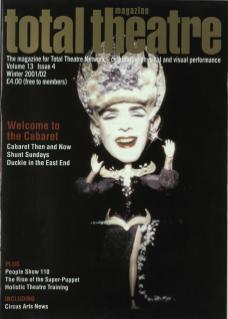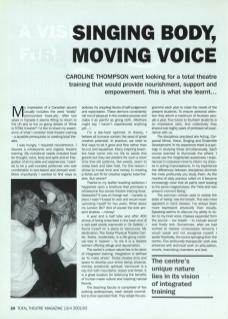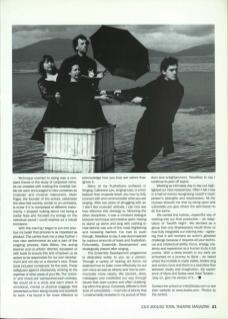My impression of a Canadian accent usually includes the word 'totally’ pronounced ‘toad-ally'. After two years in Canada it seems fitting to return to the UK and to the ongoing debate of 'What is TOTAL theatre?' I'd like to share my experience of what I consider total theatre training – a possible prerequisite to creating total theatre.
I was hungry. I required nourishment. I desired a wholesome and organic theatre training. My nutritional needs included food for thought, voice, body and spirit and an integration of all my skills and experiences. I wanted to be a well-rounded performer who was comfortable in text-based and devised work. More importantly I wanted to find ways to address my crippling blocks of self-judgement and expectation. These demons consistently rob me of pleasure in the creative process and make it as painful as giving birth. (Mothers might say I haven't experienced anything yet...)
I'm a die-hard optimist. In theory, I believe all humans contain the seed of great creative potential. In practice, we need to find ways to let it grow and flow rather than be cut and squashed. Many inspiring teachers have come into my life to assist this growth but they are present for such a short time that old patterns, like weeds, seem to creep back and take hold. For this reason I chose to invest time and money in creating a fertile soil fit for creative organic total theatre. But where?
Thanks to my leaflet hoarding addiction I happened upon a brochure that promised a wholesome five-course theatre-training feast. Obstacles? It was on foreign soil – Canada (a place I wasn't fussed to visit) and would mean uprooting myself for two years. What about my London life? And, of course, the ever present shadow – money!
A year and a half later and after 400 shows of being entombed in the back-end of a well-paid woolly mammoth in Dr Dolittle, I found myself on a plane to Vancouver. My destination: The Tooba Physical Theatre Center. Tooba, incidentally, is a life-giving mythical tree in heaven – to me it is a theatre ashram offering refuge and rejuvenation.
The centre's unique nature lies in its vision of integrated training. Integration is defined as 'to make whole'. Tooba creates time and space to develop your entire being – physical mental, emotional, spiritual. Vancouver is a city rich with mountains, ocean and forest. It is a great location for balancing the benefits of human-made culture and inspiring natural beauty.
The teaching faculty is comprised of five working professionals, each deeply committed to their specialist field. They adapt the programme each year to meet the needs of the present students. To ensure personal attention they admit a maximum of fourteen people a year. Five tutors to fourteen students is an impressive ratio. And collectively they shared over eighty years of professional experience with us.
The disciplines practised are Acting, Corporeal Mime, Voice, Singing and Ensemble Development. In my experience there is a synergy in studying these simultaneously. Each course seemed to illuminate the others. I would use the heightened awareness I experienced in corporeal mime to inform my choices in acting improvisations. In my experience the differences between disciplines diminish the more profoundly you study them. As the months of daily practice rolled on it became increasingly clear that all paths were leading to the same magical place, the 'here and now present moment Being’.
The common vehicle used to realise the state of being was the breath. This was most apparent in voice classes. I've always been more expressive physically than vocally. Speaking seems to obscure my ability to listen to my inner voice. Classes expanded from the source – our breath – to include sound and finally text. Sometimes, after we had worked to release unnecessary tensions, I would speak and not recognise myself: I spoke fearlessly, the sound springing from the centre. This profoundly therapeutic work was entwined with technical work on articulation, vowels, resonating chambers and text.
Technique married to being was a constant theme in the study of corporeal mime. As we wrestled with making the invisible visible we were encouraged to view ourselves as musician and musical instrument. Dean Fogal, the founder of the school, celebrates the idea that society, similar to an orchestra, is richer if it is composed of different instruments. I stopped sulking about not being a svelte flute and focused my energy on the individual sound I could express as a robust trombone.
With this training I began to put into practice my belief that process is as important as product. The centre took me a step further. I now view performance as just a part of the ongoing process. Kate Weiss, the acting teacher and co-artistic director, equipped us with tools to ensure this and empower us as actors to be responsible for our own development and not rely on a director's view. These tools included 'containers' for the work. These safeguard against obsessively working at the expense of other areas of your life. The 'check-in' and 'check-out' sandwiched each workday. We would sit in a circle and each check in emotional, mental or physical baggage that prevented us from being neutral and available to work. I've found it far more effective to acknowledge how you truly are rather than ignore it.
Many of my frustrations surfaced in Singing. Catherine Lee, singing tutor, is a firm believer that musicals teach you how to fully connect with and communicate what you are singing. After two years of struggling with an ‘I don't like musicals' attitude, I can now see how effective this ideology is. Mirroring the other disciplines, it was a constant dialogue between technique and creative spirit. Having to stand up alone and sing with nothing to hide behind was one of the most frightening and revealing barriers I've had to push through. Needless to say, it was accompanied by copious amounts of tears and frustration. Fortunately, Ensemble Development was strategically placed after singing.
The Ensemble Development programme is dedicated solely to you as a person. Through a variety of healing artforms we explored how to listen more effectively (to our own voice as well as others) and how to communicate more clearly. We danced, drew, massaged and meditated our way through issues that were current and often challenging within the group. Everybody differed in their level of vulnerability – I had lots of blocks that I unashamedly revealed in my pursuit of freedom and enlightenment. Needless to say I continue to peel off layers.
Working so intimately day-in day-out highlighted our interrelatedness. Often I felt I was in a hall of mirrors recognising myself in each person's strengths and weaknesses. All the courses showed me that by being open and vulnerable you give others the permission to do the same.
We carried this holistic, respectful way of working into our final production – an adaptation of Twelfth Night. We decided as a group that only Shakespeare would show us how fully integrated our training was – agreeing that it still remains an actor's greatest challenge because it requires all your technical and intellectual ability, focus, energy, creativity and experience as a human to do it full justice. With a deep breath in our sails we embarked on a journey to Illyria – an island where the invisible is made visible, bodies sing and voices move and there is a seamless flow between reality and imagination. My experience of Illyria and Tooba were Total Theatre – 'play on, give me excess of it...’
Contact the school on info@tooba.com or see their website at www.tooba.com


